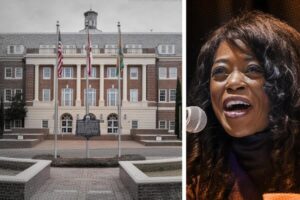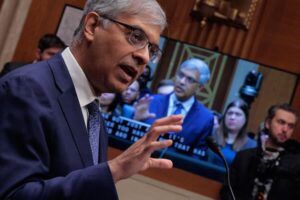
Supreme Court Weighs Who Should Decide Public School Curriculum: Judges or School Boards?
Parents of multiple faiths, and even kids, mobilized to have their views heard by the school board, with as many as 1,000 people gathering for one school board meeting. At one of these meetings, a boy who identified himself as Nick said he liked having story books that included LGBTQ characters.
“We have rights, too,” he said. “We deserve to have books in our school that teach people about LGBTQ and stuff. It’s not touching you, hurting you physically … I don’t know why you hate it so much.”
In the Supreme Court Tuesday, parents objecting to the books make two important points. First, that the Supreme Court has long ruled parents are in charge of guiding their children’s values, and second, that to force these books on their children in public school is a violation of the Constitution’s guarantee to the free exercise of religion.
As Morrison, the mother of the special needs youngster, put it: “It’s just very heartbreaking to me how many parents feel like they have to choose between educating their child and raising their children in their faith.”
While she has left her job as an oral surgeon to home-school her daughter, she notes that many parents can’t do that and can’t afford private school.
Eric Baxter, a lawyer with the Becket Fund for Religious Liberty who is representing the objecting parents in the Supreme Court on Tuesday, will tell the justices that schools have for decades allowed opt-outs for religious reasons.
“Most people believe that their children should have a period of time when they don’t have to deal with these kind of heavier topics,” he said. “It goes to their children’s very identity, how they will form families, have children. The things that most people think are some of the most important decisions you’ll make in your life.”
So how should school districts draw the line? Should parents be able to opt their kids out of a science class when there is a discussion of Darwin’s theory of evolution? Should they be able to opt out of a history class that includes a section about the women’s movement and the fight for equality in the workforce? Some religions object to both of those things.
Addressing the question of teaching evolution, Baxter replies: “So what if one kid wants to opt out of dissecting frogs during biology? A lot of states actually have laws that allow those kinds of opt-outs.”
The school board’s position
These decisions about the public school curriculum have traditionally been left to local school boards, observes Yale law professor Justin Driver, author of The Schoolhouse Gate: Public Education, the Supreme Court, and the Battle for the American Mind. He and Stanford Law professor emeritus Eugene Volokh, who has written extensively about the First Amendment, filed a friend of the court brief, siding with the school board in this case. For the most part, they say that the courts have deferred to local school boards unless there is evidence that students are being coerced into accepting an underlying religious belief.
The two scholars maintain there is no evidence of coercion here. Rather, as Driver says, “It seems to me that … the process [is] working as it should. People have raised objections, the school district has heard those objections and modified their practice.”
This is not a case of children being coerced into religious beliefs, he contends. It is a case of some parents wanting to avoid having their children even being exposed to a wide variety of ideas in class, including a book, for instance, in which a child attends his uncle’s wedding to another man.
“Public school is meant to be for a broad group and some individuals are going to express misgivings about the curriculum decisions,” Driver contends. “But it has not been the Court’s tradition to permit those individuals to carry the day. … In a big, religiously diverse country like the United states, local public schools have not been required to afford these opt-outs because of the workability concerns for the public schools.”
Indeed, because school boards do reflect the views of their constituents, there are places, like San Francisco, where some books with LBGTQ+ themes are required in the curriculum.
“It’s important to appreciate who is the right entity for making curricular decisions,” Driver adds. “Is it the public school, or is it federal judges?”
That said, the odds of the Supreme Court using this case to require some sort of opt-outs for religious objectors are pretty high. The current court, dominated by very conservative justices, including three Trump appointees, has increasingly focused not on the Constitution’s guarantee of separation between church and state, but on the First Amendment guarantee to the free exercise of religion.



